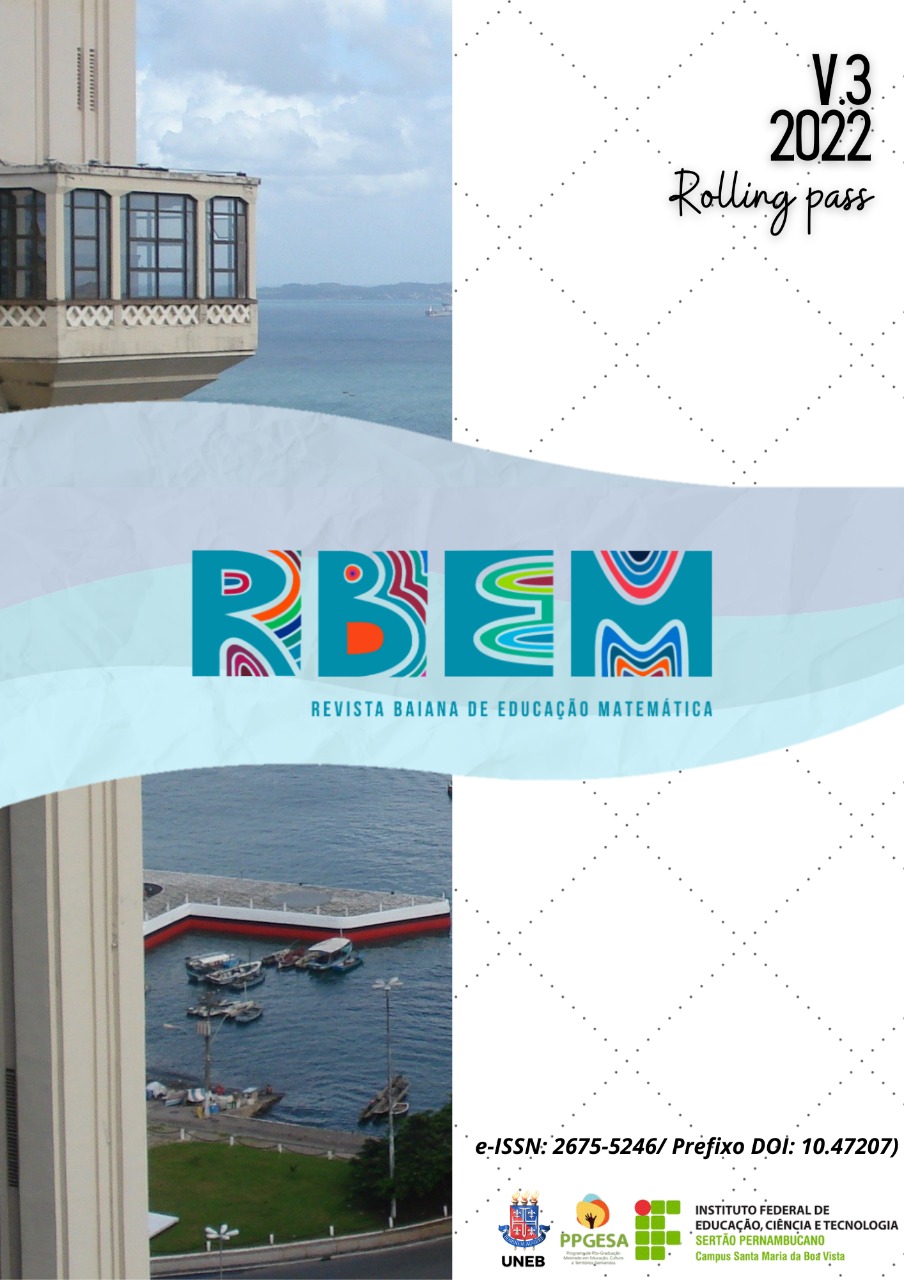What do Mathematics teachers think about the textbook: from the selection process to its use as a teaching resource
Main Article Content
Abstract
The textbook is one of the most used pedagogical resources in the teaching and learning process in the Brazilian school context, including a specific program instituted through public policy for more than twenty years: the National Book and Teaching Material Program (PNLD). In this field of dispute, there are the Basic Education teachers who are part of the process of choosing the material that arrives (or should arrive) in schools. In this sense, the present research aims to analyze the perceptions of Mathematics teachers about the process of choosing the textbook and its use in the classroom, including during remote teaching, a modality motivated and conditioned in the country because of the pandemic crisis. For that, this research with descriptive qualitative characteristic (GIL, 2002), used for data collection questionnaires that were applied to a group of 21 Mathematics teachers from the state and municipal schools of a city in the interior of Rio Grande do Sul, working in the Basic education. The results show that teachers recognize themselves as essential agents in the process of choosing didactic material, assuming this responsibility and requiring greater space and freedom in this selection, since the textbook is still a resource widely used by teachers.
Downloads
Article Details
Uma nova publicação de artigo anteriormente publicado na Revista Baiana de Educação Matemática, fica sujeita à expressa menção da precedência de sua publicação neste periódico, seguindo as normas de referência. Autores que publicam na RBEM concordam com os seguintes termos:
-
O Conselho Editorial se reserva ao direito de efetuar, nos originais, alterações de ordem normativa, sintática, ortográfica e bibliográfica com vistas a manter o padrão culto da língua, respeitando, porém, o estilo dos autores. As provas finais poderão ou não ser enviadas aos autores.
-
Autores mantém os direitos autorais e concedem à revista o direito de primeira publicação, com o trabalho simultaneamente licenciado sob a Licença Creative Commons Attribution (CC BY-NC-SA).
-
Autores têm autorização para assumir contratos adicionais separadamente, para distribuição não-exclusiva da versão do trabalho publicada nesta revista, exemplo: publicar em repositório institucional ou como capítulo de livro, com reconhecimento de autoria e publicação inicial na RBEM.
-
Autores têm permissão e são estimulados a publicar e distribuir seu trabalho online — em repositórios institucionais, página pessoal, rede social ou demais sites de divulgação científica.
References
BRASIL. Ministério da Educação. Guia de livros didáticos PNLD 2014: Matemática. Ministério da Educação: Secretaria de Educação Básica, 2013.
BRASIL. Diário Oficial da União. Decreto n. 9.099, de 18 de junho de 2017. Dispõe sobre o Programa Nacional do Livro e do Material Didático, 2017.
CAIMI, F. E. O livro didático e o currículo de história em transição. Passo Fundo: EDIUPF, 1999.
CARVALHO, J. B. P.; LIMA, P. F. Escolha e uso do livro didático. In: Matemática: Ensino Fundamental. João Bosco Pitombeira Fernandes de Carvalho/coord. Brasília: Ministério da Educação, Secretaria de Educação Básica, 2010
CONTRERAS, J. Autonomia de professores. São Paulo: Cortez, 2002.
CHOPPIN, A. História dos livros e das edições didáticas: sobre o estado da arte. Educação e Pesquisa – FEUSP, São Paulo, v. 30, n. 3, p. 549-566, set./dez. 2004.
DANTE, L. R. Livro didático de Matemática: uso ou abuso? Revista Em Aberto, v. 16, n. 69, 1996.
FIORENTINI, D. Alguns modos de ver e conceber o ensino da matemática no Brasil. Revista Zetetiké, ano 3, n. 4, 1995.
FREITAG, B. O livro didático em questão. São Paulo: Cortez, 1989.
GARCIA, T. M. F. B.; SILVA, E. F. Livro didático de física: o ponto de vista de alunos do ensino médio. In: CONGRESSO NACIONAL DE EDUCAÇÃO – EDUCERE, 9., 2009, Curitiba; ENCONTRO SUL BRASILEIRO DE PSICOPEDAGOGIA, 3., 2009, Curitiba. Anais... Curitiba: PUCPR, 2009, p. 8595-8606.
GIL, A. C. Como elaborar projetos de pesquisa. 4. ed. São Paulo: Atlas, 2002.
LAJOLO, M. Livro didático: um (quase) manual de usuário. Revista Em Aberto. Brasília, v. 26, n. 69, p. 3-7, jan. /mar., 1996.
LOPES, J. A. Livro didático de matemática: concepção, seleção e possibilidades frente a descritores de análise e tendências em Educação Matemática. Tese (Doutorado em educação) – Faculdade de Educação, Universidade Estadual de Campinas, Campinas, 2002.
LÜDKE, M.; ANDRÉ, M. E. D. A. Pesquisa em educação: abordagens qualitativas. São Paulo: EPU, 1986.
MORTIMER. E. F. A evolução dos livros didáticos de química destinados ao ensino secundário. Revista Em Aberto, v. 7, n. 40, p. 25-41, 1988.
RIBEIRO, M. L. História da Educação Brasileira: organização escolar. Campinas, SP: Autores Associados, 2003.
PIMENTA, S. G.; GHEDIN, E. (Org.) Professor reflexivo no Brasil: gênese e crítica de um conceito. São Paulo: Cortez, 1999.
SANTOS, V. A.; MARTINS, L. A importância do livro didático. Candombá – Revista Virtual, v. 7, n. 1, p. 20-33, jan – dez, 2011.
TARDIF, M.; RAYMOND, D. Saberes, Tempo e Aprendizagem do trabalho no magistério. São Paulo: Revista Educação e Sociedade, no 73, pp. 209-244, 2000.
THOMPSON, A. G. Teachers Beliefs and Conceptions: A synthesis of the research. In D. A Grows (Ed), Handbook of research on Mathematics Teaching and Learning, pp. 127-146. New York: Macmillan Publishing Company, 1992.

